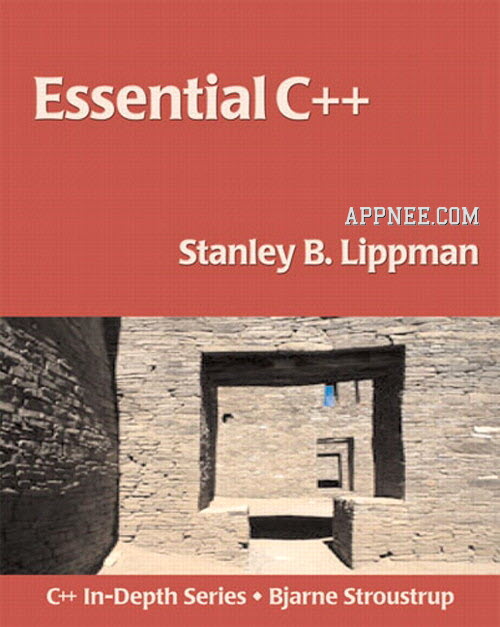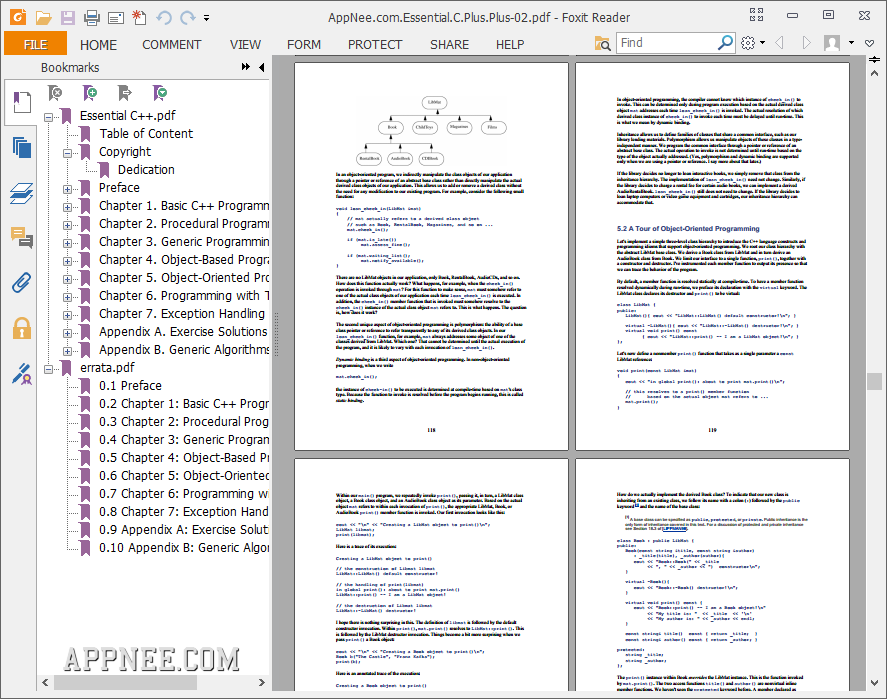
If I tell you the publication date of this book is 1999, and has only one edition, many beginner readers will be dismissive that I can imagine. But please note that, whether you are newbie or expert, Essential C++ is the top grade of classic work all the time. In other words, as long as you want to be proficient in C++, then this Essential C++ written by the C++ master Stanley B.Lippman is required.
The whole book reveals the essence of C++ from 4 aspects: procedLJral, gerleric, object-based and object-oriented. It centers on a series of distinguished programming problems, and introduces the language features used to solve these problems. In this way, readers can not only learn the function and structure of C++, but also are able to learn their design purpose and basic principle.
Essential C++ is especially suitable for engineers who transferred from other languages to C++ and desperately need to use C++ to solve the practical programming problems in their projects, thus not very suitable for beginners. For some newbie readers, if you find it's obscure, please read The C++ Programming Language or C++ Primer Plus instead (C++ Primer is for experienced readers too). BTW, when you felt that Essential C++ is really a good book, then you must have been a C++ master.

Table of Contents
- 1. Basic C++ Programming.
- How to Write a C++ Program.
- Defining and Initializing a Data Object.
- Writing Expressions.
- Writing Conditional and Loop Statements.
- How to Use Arrays and Vectors.
- Pointers Allow for Flexibility.
- Writing and Reading Files.
- 2. Procedural Programming.
- How to Write a Function.
- Invoking a Function.
- Providing Default Parameter Values.
- Using Local Static Objects.
- Declaring a Function Inline.
- Providing Overloaded Functions.
- Defining and Using Template Functions.
- Pointers to Functions Add Flexibility.
- Setting Up a Header File.
- 3. Generic Programming.
- The Arithmetic of Pointers.
- Making Sense of Iterators.
- Operations Common to All Containers.
- Using the Sequential Containers.
- Using the Generic Algorithms.
- How to Design a Generic Algorithm.
- Using a Map.
- Using a Set.
- How to Use Iterator Inserters.
- Using the iostream Iterators.
- 4. Object-Based Programming.
- How to Implement a Class.
- What are Class Constructors and the Class Destructor?
- What are mutable and const?
- What is the this Pointer?
- Static Class Members.
- Building an Iterator Class.
- Collaboration Sometimes Requires Friendship.
- Implementing a Copy Assignment Operator.
- Implementing a Function Object.
- Providing Class Instances of the iostream Operators.
- Pointers to Class Member Functions.
- 5. Object-Oriented Programming.
- A Tour of Object-Oriented Programming.
- Polymorphism without Inheritance.
- Defining an Abstract Base Class.
- Defining a Derived Class.
- Using an Inheritance Hierarchy.
- How Abstract Should a Base Class Be?
- Initialization, Destruction, and Copy.
- Defining a Derived Class Virtual Function.
- Run-Time Type Identification.
- 6. Programming with Templates.
- Parameterized Types.
- The Template Class Definition.
- Handling Template Type Parameters.
- Implementing the Template Class.
- A Function Template Output Operator.
- Constant Expressions and Default Parameters.
- Template Parameters as Strategy.
- Member Template Functions.
- 7. Exception Handling.
- Throwing an Exception.
- Catching an Exception.
- Trying for an Exception.
- Local Resource Management.
- The Standard Exceptions.
- Appendix A: Exercise Solutions.
- Appendix B: Generic Algorithms Handbook.
Edition Statement
What AppNee provided you are the original CHM format of Essential C++ and its perfect HD PDF format with errata files integrated and no watermark. Believe me, they are the only best ones you can find on the whole Internet.Prompts
- This book makes each word a gem, you have to calm down and read slowly
- The two appendices are extremely valuable:
- Complete solutions and detailed description of exercises
- A quick reference manual for gerleric algorithm (including using instances)
Book Example Codes
Dowload the Source Code by clicking on the links below:Download URLs
| Format | Download | Size |
 |
3.25 MB | |
| CHM |  |
401 KB |